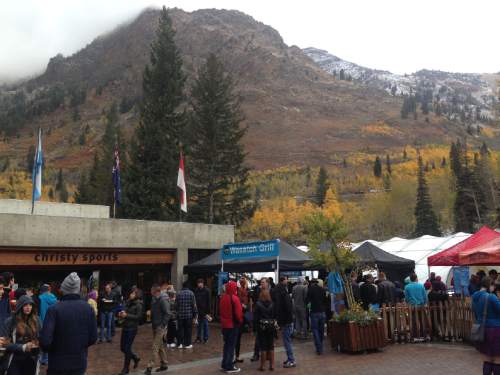This is an archived article that was published on sltrib.com in 2016, and information in the article may be outdated. It is provided only for personal research purposes and may not be reprinted.
The lawyer for a Utah family has asked the state liquor commission to restrict or prevent Snowbird Ski & Summer Resort from serving alcohol at Oktoberfest, alleging the resort fails to adequately control the sale of booze during the annual German-themed event.
"The way alcohol is served and presented encourages drinking," Attorney Jim McConkie told the Utah Department of Alcoholic Beverage Control commission on Tuesday.
McConkie contends that Snowbird needs to improve security measures and should even conduct sobriety checks for people leaving Oktoberfest to prevent drunk driving down Little Cottonwood Canyon.
In September, McConkie sued Snowbird on behalf of Brent and Laura Anderson. The Utah couple allege that they, along with their 23-year-old son, were attacked by drunken Oktoberfest patrons after riding the tram to the top of Hidden Peak in 2014. In the lawsuit, Brent Anderson said he was beaten around the head and suffered head and eye injuries; his wife suffered a serious ankle injury that required surgery; and their son, suffered a head injury.
Snowbird has filed a motion to dismiss the lawsuit, with a hearing set April 18 before 3rd District Judge Heather Brereton.
The three defendants, ages 23, 24 and 32, pleaded guilty to misdemeanor charges. Two of the men served three days in jail as part of a sentence also including a year-long probation. The third will be sentenced in March.
As part of the civil lawsuit, McConkie said his firm hired an undercover investigator who worked for three days during the 2015 Oktoberfest celebration to monitor alcohol consumption and security controls.
McConkie said the investigator observed people who were visibly intoxicated either slurring their words, acting overly boisterous or having difficulty walking. The investigator also witnessed people vomiting in public and passed out at tables. McConkie provided photographs and a video to the liquor commission to support the allegations.
"The most concerning situation was watching people intoxicated get into their cars and drive down the canyon," said McConkie. "A festival centered on drinking just creates problems when people leave."
Tom Jones, the senior vice president at Snowbird, disputed McConkie's allegations, saying the presentation was designed "to draw attention to a lawsuit."
"Guest and employee safety is our top priority," Jones told the commission.
Snowbird has sponsored Oktoberfest for 44 years and it has never received a citation, Jones said. "Our track record speaks for itself."
Jones said that while alcohol is served at Oktoberfest, the celebration also includes food, music, dancing, tram rides and hiking. For guests who choose to imbibe, Snowbird offers complimentary rides down the canyon and has a partnership with ride sharing service Uber. Oktoberfest takes place weekends from mid-August through October.
Liquor commission chairman John T. Nielsen said some issues are beyond the DABC's control.
"Some of this goes to security and law enforcement," Nielsen said. "But it may be possible to facilitate meetings with Sheriff (Jim) Winder and others."
Sheila Page, the DABC's legal counsel, added that "the commission's jurisdiction is limited and it doesn't include traffic stops."
To serve alcohol at Oktoberfest, Snowbird must apply for a special-event permit from the DABC. To be granted the permit, a group must prove that it has adequate controls in place to prevent underage drinking and over-consumption. Security measures range from wristbands for those over 21, designated beer gardens and hiring law enforcement.
Tuesday's discussion wasn't the first time that liquor at Oktoberfest has made headlines. Two years ago, the state liquor commission sparked a frenzy after it told Snowbird officials that the resort might not receive its single-event permit for Oktoberfest. At the time, commission and staff at the DABC had begun using a stricter interpretation of state law when granting the single-event permits — namely favoring a "civic or community group that promoted a common good" over a for-profit business that already had other state liquor licenses.
The negative publicity created heartburn among Utah lawmakers who expressed their displeasure with the commission's actions.
Since then, the commission has approved a new rule that gives more weight to local cities and communities.
Tribune reporter Steve Hunt contributed to this story.



